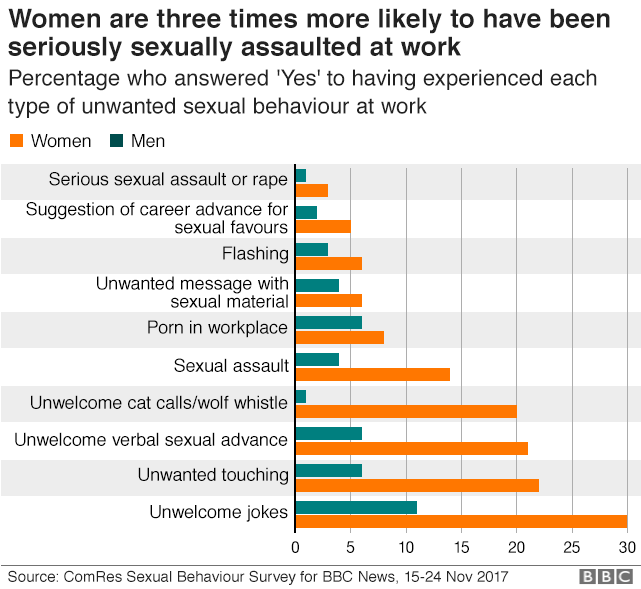Harassment survey: 'I'm a waitress but I feel like a sex worker'
- Published
These young women told the BBC about their experiences of sexual harassment at work
Nilufer Guler is a waitress, but says she feels more like a sex worker at times.
On the second day in a new job, a table of wealthy, suited men said they would "buy her" off her manager so she could eat expensive steak with them.
They asked if she had an intimate piercing and stared at her throughout their meal.
"It's so disrespectful but I couldn't complain. It's a very precarious industry," she says.
And she's not alone.
Two in five women in the UK say they have experienced unwanted sexual behaviour at work and only a quarter of them reported it, a BBC survey has found, external.
Among men, one in five (18%) said they have been harassed at work.
The poll of more than 6,000 men and women, one of the largest ever conducted into sexual harassment in the workplace, suggested those who work flexibly are more likely to encounter this type of behaviour.

Of those in flexible working - including those on zero hours contracts, self employed, freelancers and gig economy workers - 43% had experienced some form of sexual harassment at work.
It's a situation Camille Ukpanah from London can relate to.
The 24-year-old worked as a bartender and waitress for an agency. She says guests would make derogatory remarks towards her and her colleagues, and she once saw a man trying to pull up her colleague's skirt in a room full of people.
"The girl had to keep working otherwise she wouldn't have got paid," she says.
When she went to the agency, she says she was met with a cold response.
"You explain certain things that happen but they brush it over. They would say 'if you want to leave, you can go - there are so many people looking for work.'"
'Women are disempowered'
Waitress Nilufer Guler agrees.
"With the use of zero hour contracts, agency work and unfair tipping schemes it's no surprise that sexual harassment is rife in the industry."
"They take power away from workers so that they cannot demand better conditions. They can't come forward about sexual harassment and win."
She says she believes there is hostility towards unions and democracy in the hospitality industry.
"This is why there's no avenue for waitresses to speak out, no process of accountability... This is why we need to form unions and work collectively to bring an end to sexual harassment and its normalisation."
Those taking part in the survey were asked about the most common behaviours they had faced, ranging from unwelcome jokes to pornography and rape.

The public spotlight has been focused on sexual harassment since October when Hollywood heavyweight Harvey Weinstein was first accused of harassment and assault.
The story snowballed as A-listers Gwyneth Paltrow, Angelina Jolie and Cara Delevingne added their names to a long list of women claiming Weinstein had preyed on them.
The scandal deepened as men and women shared their own experiences at the hands of powerful men in Hollywood, on TV and beyond, culminating in the #metoo Twitter campaign, which saw people across the world tell their stories.

For those who have spent decades in the workplace, the whole idea of sexual harassment at work is relatively new, but one that has prompted reflection.
Those polled were asked if they agreed that: "Looking back over my working life, I have witnessed behaviour that I now believe to constitute sexual harassment but didn't think it at the time."
Four in 10 (42%) over-55s agreed. Among those near the start of their working lives (18 to 34-year-olds), three in 10 felt the same way.
Sandy tells the BBC how a surgeon would put his hands up nurses' skirts
Meg, who did not want to give her surname, said she believed change was already under way, as people had begun to talk about things as "unacceptable".
"A few years ago, it was just like 'oh, he's just a dirty old man and that's what happens'".
Her friend, Maureen, agreed. "It sounds shocking but we didn't use the term assault, we were molested.
"You were molested in transport, in pubs, in social gatherings. It was normal."
There was a general optimism among most people surveyed that the recent scandal would bring sustained improvements in behaviour, but almost a third thought the scandals were irrelevant to people's behaviour.
Confidence that things would change was highest among younger people - three quarters of 18 to 34-year-olds expected to see long-term changes in behaviour, while about a third of over-65s had their doubts.
Office worker Honey Jamie said: "It is fantastic that so many strong women are now banding together. And they refuse to accept it.
"It's great that so many people are standing up against it, but it's sad that we still have to," she said.
- Published14 November 2017

- Published6 October 2017

- Published19 October 2017
